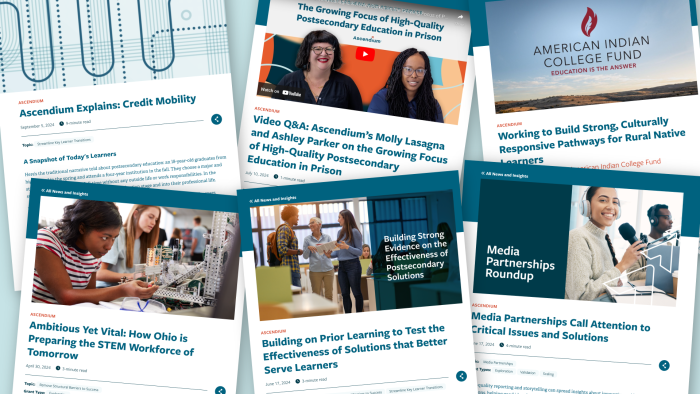
Building Data-Driven Pathways to Good Jobs Through Community Partnerships
 When the federal government invested $1.2 trillion in infrastructure jobs in 2021, it generated up to two million new, well-paying jobs per year for the next decade. This commitment to improve infrastructure and create good jobs presents a tremendous opportunity for learners from low-income backgrounds across the country. For the field of postsecondary education and workforce training, though, it raises an important question: How do we ensure that there are effective training pathways to these good jobs?
When the federal government invested $1.2 trillion in infrastructure jobs in 2021, it generated up to two million new, well-paying jobs per year for the next decade. This commitment to improve infrastructure and create good jobs presents a tremendous opportunity for learners from low-income backgrounds across the country. For the field of postsecondary education and workforce training, though, it raises an important question: How do we ensure that there are effective training pathways to these good jobs?
One approach is for postsecondary education and workforce training providers to use labor market data to drive partnerships with employers and community-based organizations in developing a relevant workforce pipeline for learners. Two recent grants demonstrate Ascendium’s continued commitment to designing and building such inclusive, evidence-based talent pipelines that support learners in securing in-demand jobs in their communities. Both grants begin with the study of labor market data on good jobs in their regions to answer the following questions. Where are the people who can fill the region’s demands? And how can we connect those people with these good jobs?
In partnership with the American Indian College Fund, Ascendium has made a $2.5 million grant to five tribal colleges and universities (TCUs) to implement career development programming for their learners. This four-year grant aims to better prepare American Indian and Alaska Native learners from low-income backgrounds for, and connect them with, good jobs in their regions.
This grant will increase TCUs' capacity to build career pathways and provide career services by collecting data on local employment needs, expanding partnerships with local employers, and designing and implementing learner-focused approaches to advising and career readiness. Doing this will involve identifying gaps in programming and learner supports by analyzing learners’ journeys from enrollment to employment. In putting that data to work, this grant will scale campus-specific solutions to determine best practices for fostering American Indian and Alaska Native learner success.
The second recent grant will similarly design and implement locally specific postsecondary education and workforce training strategies and then explore their potential to work at scale. By centering community colleges and their partnerships with regional employers and stakeholders, a grant to the National Fund for Workforce Solutions seeks to align training and credential programs with good jobs for learners of color from low-income backgrounds. This three-year, $2 million grant from Ascendium will support their efforts to understand how community colleges can help diversify talent pipelines for high-quality jobs and create equitable opportunities for upward mobility.
The National Fund for Workforce Solutions plans to do this by gathering data on who is completing which programs and what the workforce outcomes are. With this information, they will coordinate partnerships between community colleges, industry, employers, and local leaders, thereby helping postsecondary education providers systemically develop workforce training and career navigation programs specific to their regions.
Ascendium is pleased to partner with the American Indian College Fund and the National Fund for Workforce Solutions, as both organizations recognize the unique contexts shaping learners’ postsecondary education and workforce outcomes. With their focus on meeting the needs of all learners from low-income backgrounds, these grants ultimately seek to drive changes to postsecondary education and workforce training systems, workplaces, and communities across the country.


